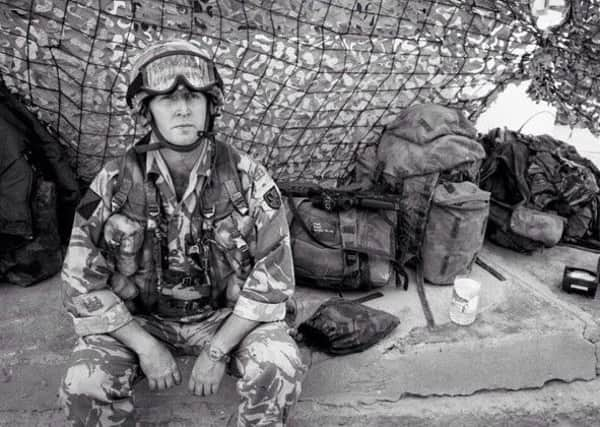Doug Beattie: Blair was at fault but the blame must be spread much more widely


War polarises opinion, but few military campaigns have left such a bitter taste and generated so much emotion as the 2003 invasion of Iraq.
While few doubt the courage and noble motivation of those servicemen and women sent to fight the battles, many will regard the political decision to send them as little more than an exercise in deception.
Advertisement
Hide AdAdvertisement
Hide AdStanding in Fort Blair Mayne deep in the Kuwati desert, an encampment built from nothing by the men of the Royal Irish Regiment, I remember the daily routine of training for war, mission rehearsals and daily intelligence briefings.
At no stage was there any doubt that Saddam Hussein’s Ba’athist regime had the ability to deploy weapons of mass destruction. In fact, as I stood beside Colonel Tim Collins, our Commanding Officer, I remember his clear unambiguous words to the battalion he was about to take to war. The first time since the Korea.
“It is not a question of if, it’s a question of when. We know he has already devolved the decision to lower commanders, and that means he has already taken the decision himself. If we survive the first strike we will survive the attack.”
Colonel Tim was a smart man, a sharp operator and a skilled leader. He would not have been fooled easily, yet like the rest of us he was.
Advertisement
Hide AdAdvertisement
Hide AdOn a daily basis, before the invasion, the men practised their Chemical, Biological, Radiological and Nuclear (CBRN) defense drills. So it was until the day we crossed the border into Iraq. Poorly equipped, unprepared and misled by our political leaders the invasion of Iraq began.
As men and equipment spilled crossed the border into Iraq politicians continued the masquerade of a just and legal conflict.
It is easy to blame Tony Blair, and as our Prime Minister fault must lie at his door. But it spreads much further. The dossier that gave us the evidence of weapons of mass destruction had been formulated by the United Kingdom’s intelligence services: MI6 and MI5. The Foreign Office would have had an input. The Home Office will not have been ignorant. And the entire Labour Cabinet will have had some hand in promoting the dossier’s deadly message.
Parliament itself cannot dodge censure. Many MPs allowed themselves to be misled and voted for war. So did our top military leaders. Their collective eagerness to please led to a hurried deployment, beleaguered by a lack of planning and poor force generation.
Advertisement
Hide AdAdvertisement
Hide AdThe latter point was starkly illustrated by the inclusion of 16 Air Assault Brigade (16AA) - of which the Royal Irish Regiment was part - in the order of battle. As the name suggests this premier unit should be delivered to the battlefield by air manoeuvre – instead it rattled across the border into Iraq in lumbering trucks designed to carry cargo not fighting men.
Soldiers without body armour, with no desert clothing or boots, no ammunition for vital weapons systems and poor communications equipment we crossed into Iraq. As the Regimental Sergeant Major my initial role was to take control of the enemy prisoners of war. What I found was wretched individuals that appeared nothing like an enemy that needed defeating. There was no pride or glory in killing these fighters, many surrendered without a fight happy to be under the control of the Irish Battlegroup as prisoners of war.
Yet some did fight and died and I watched as my soldiers laid them to rest showing them the respect and dignity we all deserve in death. My soldiers gave away their own food, their own water, and when ordered to stop they scavenged the countryside for food for their prisoners until the resupply chain caught up with the fighting elements.
Much of this compassion and gentleness is largely forgotten as the war evolved into a protracted and bloody insurgency and the actions of a few, in places like Camp Breadbasket and Abu Ghraib, belittled the many. Yet, arguably, these incidents of abhorrent behaviour were in part a reflection of the failure of UK/US-led coalition to prepare for an outcome that was always likely.
Advertisement
Hide AdAdvertisement
Hide AdI remain proud of what my men did in Iraq and it is important that the servicemen and women who were asked to fight this conflict are shown the respect and understanding they deserve. This is doubly important for family members who lost loved ones either during the conflict or after, due to related mental health problems.
It is OK to hate the war but love the soldier who did nothing more than what was asked of him.
Colonel Tim finished his eve of battle speech with these words:
“As for ourselves, let’s bring everyone home and leave Iraq a better place for us having been there.”
Advertisement
Hide AdAdvertisement
Hide AdSadly we did not - and the legacy of the Iraq war will not be forgotten on the publication of the Chilcot report. It will continue to affect our foreign policy for many years to come and will remain embedded in the memories of those who fought the war and were lucky to survive.
• Doug Beattie MC MLA was awarded the ‘Queens Commendation for Bravery’ for his actions during the invasion of Iraq.